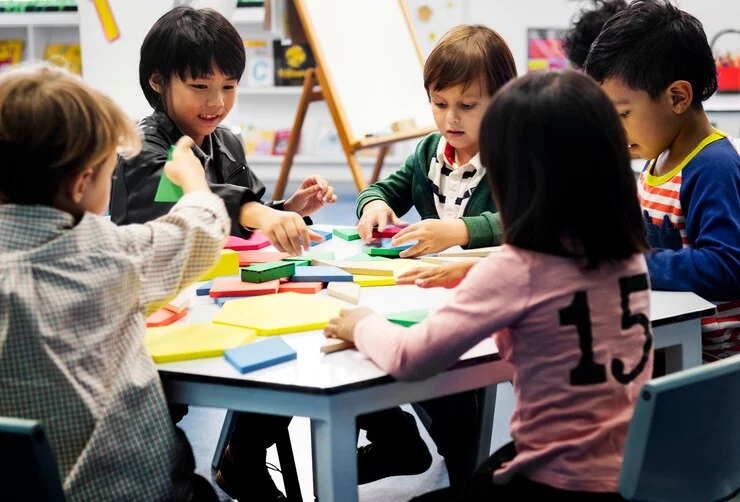Early childhood education is like the foundation of a strong building. Just as a solid foundation is necessary for a sturdy structure, early childhood education plays a crucial role in shaping the future of graduates. This period, typically from birth to around 8 years old, is when children learn and develop the fundamental skills and attitudes that will stay with them throughout their lives. In this article, we will explore how early childhood education impacts future graduates in simple words.
1. Building The Basics
Think of early childhood education as the time when you start learning the ABCs and 123s of life. This is when children are introduced to the very basics of education. Learning to read, write, and count is like the first step in a long journey. These skills form the foundation for all future learning.
Imagine a house without walls; it wouldn’t stand for long. Similarly, without a strong foundation in early childhood education, it becomes challenging for students to build their knowledge as they progress through school. So, these early years are when kids start building the walls of their educational house.
2. Social Skills

Early adolescence schooling is not pretty much academics; it is also approximately gaining knowledge of the way to engage with others. Children examine critical social abilities during this time, which include sharing, taking turns, and operating as a part of a team. These competencies are important no longer handiest for his or her future training but also for life in preferred.
When youngsters learn to get along side others, it helps them form wonderful relationships at some point of their lives. These early experiences in socializing can shape how they interact with classmates, coworkers, and friends within the destiny.
3. Problem-Solving Abilities
Life is full of issues, each massive and small. Early youth education helps children increase trouble-solving capabilities. When they face challenges in a safe and supportive environment, they discover ways to think critically and give you answers.
These hassle-fixing skills are vital for tackling academic challenges and, in a while, real-international problems. Whether it’s identifying a math trouble or resolving a warfare with a friend, the problem-fixing competencies developed in early childhood education are useful.
4. Creativity And Imagination

Imagination is a effective device, and it’s nurtured for the duration of early adolescence schooling. Through activities like drawing, storytelling, and creative play, children discover ways to explicit themselves and suppose creatively. These abilties can later be carried out in various fields, from artwork and literature to technological know-how and enterprise.
Creativity and creativeness also foster innovation, that is essential in a hastily converting global. Future graduates who’re encouraged to assume creatively can come up with new thoughts and solutions which can form the destiny in nice approaches.
5. Confidence And Independence
Early early life education enables kids construct self belief and independence. When they’re advocated to strive new things, make selections, and solve problems on their own, they increase a sense of self esteem and self-confidence. These features are crucial for achievement in faculty and beyond.
Confident and independent individuals are much more likely to take dangers and pursue their desires. They are less frightened of failure and extra resilient inside the face of challenges. This mind-set can result in more success of their academic and professional lives.
6. Lifelong Learning

One of the maximum essential instructions of early childhood training is the affection of getting to know. When youngsters are introduced to a wide variety of topics and activities, they expand a interest about the world round them. This interest can turn into a lifelong passion for mastering.
Graduates who keep to embody learning in the course of their lives are much more likely to evolve to new conditions and thrive in a converting process marketplace. Lifelong rookies are better equipped to collect new abilities and stay relevant in their selected fields.
7. Better Academic Performance
Early early life schooling has an immediate effect on educational overall performance in later years. Research has proven that kids who get hold of pleasant early education are more likely to do properly in school. They have a tendency to have better analyzing and math ratings, decrease fees of grade repetition, and a greater likelihood of graduating from excessive school and pursuing higher training.
By offering a sturdy academic basis, early adolescence education sets students on a direction to instructional fulfillment. This success can open doors to a extensive range of opportunities in the future.
8. Reducing Achievement Gaps
Early formative years schooling additionally performs a crucial position in lowering success gaps. Children from disadvantaged backgrounds frequently start faculty with fewer abilities and less publicity to instructional possibilities. Quality early formative years programs can help degree the gambling subject via presenting those youngsters with the assist and sources they want to be successful.
By narrowing achievement gaps, early adolescence schooling contributes to a greater equitable society wherein every toddler has a fair chance to gain their complete potential.
Conclusion
In simple words, early childhood education is like the first chapter in a book. It lays the groundwork for everything that comes next. It helps children build the basic skills they’ll need for the rest of their educational journey and beyond. It teaches them how to interact with others, solve problems, think creatively, and be confident and independent. It instills a love of learning that can last a lifetime.
So, when we talk about how early childhood education shapes future graduates, we’re talking about how it prepares them to succeed in school, in their careers, and in life. It’s a crucial investment in our children’s future and in the future of our society as a whole. By giving children a strong start, we’re helping them build a brighter and more promising future.
Also Refer : How Can Interactive Webinars Improve Education?
FAQs
1. At what age should a child start early education?
Early education can begin as early as infancy with activities that stimulate development.
2. Is preschool necessary for a child’s success?
While not mandatory, preschool provides a structured learning environment that can greatly benefit a child’s development.
3. How can parents support early education at home?
Parents can read to their children, engage in educational activities, and create a stimulating learning environment.
4. What are the long-term benefits of early childhood education?
Long-term benefits include improved academic performance, increased earning potential, and better social skills.
5. Are there government programs that support early education?
Many countries have government-funded programs aimed at providing access to quality early education for all children.
Source Image : Freepik.com




